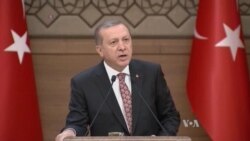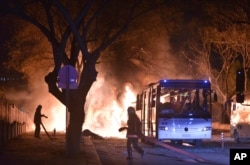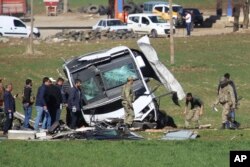Bombings in Turkey this week are escalating the conflict between Ankara and Kurdish separatists, as well as raising new questions of whom the United States is supporting in the Syrian conflict and the scope of U.S. objectives.
Analysts warn the attacks could also lead to a wider involvement by Turkish forces in Syria and further strain its relations with the U.S.
The larger attack, a suicide car bomb in the heart of Turkey’s capital, Ankara, that killed 28 people Wednesday, drew a quick and angry promise of retaliation from President Recep Tayyip Erdogan, who blamed Kurdish separatists and their outside supporters – a reference to Syria.
“Even though those who head the PYD and PKK say this has no connection with them, based on the information obtained by our interior minister and our intelligence agencies, it is identified that this is done by them,” Erdogan said in a televised speech.
Turkish forces have been at war with the PKK, or Kurdistan Workers’ Party, for decades.
Crackdown on PKK
Since last year, southeastern Turkey has become a battleground as Erdogan stepped up a crackdown on Kurdish separatists following the collapse of a fragile cease-fire.
Erdogan has also expanded the fight into Syria, with Turkish tanks at the border firing into Syrian territory where Kurdish forces operate.
Analysts said the latest bomb attacks give the Turkish leader a reason to escalate his offensive.
“It strikes me that Mr. Erdogan is not somebody who needs an excuse to pursue these kinds of policies, but I would expect that he will certainly use it to his advantage,” said Davis Lewin, head of policy at the Henry Jackson Society, a research organization in London.
“He will readily use this and any other political event that he can to harness what his own strategic needs are and do that,” Lewin told VOA.
Erdogan’s response threatens to further damage the already troubled relationship between Turkey and the U.S.
"A Turkish military intervention would increase the tensions more. I do not think Turkey would dare an armed intervention," Gonul Tol, an analyst at the Middle East Institute in Washington, told VOA.
The two NATO allies both want to topple Syrian President Bashar al-Assad and destroy the Islamic State militant group; but their interests are opposed when it comes to the Kurds.
Kurdish fighters
While Turkey is targeting Kurdish fighters in Syria, the U.S. has armed them and continues to support them.
The main U.S. objective in the Syrian conflict is to degrade and ultimately destroy the Islamic State group, and to that end, the U.S. has relied on Kurdish fighters to repel Assad’s offensive in northern Syria.
Turkey’s goal is to stop Kurdish fighters on both sides of its border with Syria.
The Kurds’ growing influence in the conflict is deeply troubling to Erdogan, who fears their access to weapons and military training could strengthen their push for an independent state, largely on what is now Turkish territory.
“The first opponent for Ankara in Syria is the Assad regime and the second opponent is the PYD, the de facto Kurdish political entity right now running northern Syria," Metin Gurcan, an independent security analyst in Istanbul and a former major in the Turkish military’s special forces, told VOA.
"So Turkey and the United States, both of these actors, they have different political end stakes in Syria,” Gurcan added.
Erdogan has made known his frustration with the United States.
Washington chastised
In a fiery speech on February 10, the Turkish leader chastised Washington for supporting Kurdish rebels, who he said had turned the region into a “sea of blood.”
“I call on America, how many times have I explained this to you? Are you on our side or the side of the terrorist PYD and PKK organization?” Erdogan asked.
The speech came a day after his government summoned the U.S. ambassador in Ankara.
Turkey wants the United States to stop supporting Kurdish rebels in Syria, and much of its anger recently has been over Washington’s refusal to designate the PYD as a terrorist group.
On Friday, Erdogan expressed concern that the Obama administration has still not done this and suggested the U.S. is making a mistake that could have wide-reaching consequences.
“Months ago in my meeting with him (President Barack Obama), I told him the U.S. was supplying weapons. Three plane loads arrived, half of them ended up in the hands of Daesh, and half of them in the hands of the PYD,” Erdogan said. Daesh is an Arabic acronym for the Islamic State group.
U.S. officials are focusing on the positive elements of a relationship they consider extremely valuable.
'Understand the concerns'
“We understand the concerns that Turkey has long expressed about some of these groups, some of these Kurdish groups. And we’re going to continue to have that discussion with them, because we appreciate their contributions,” State Department spokesman John Kirby said recently when a reporter asked about Turkey’s complaints.
“We also appreciate that they have these concerns, and we’re going to continue to work our way through that,” Kirby said.
After the deadly bombing in Ankara that targeted military personnel, Washington quickly offered condolences to the Turkish government and the State Department reiterated the “steadfast commitment” of the U.S. to its partnership with Turkey “in the shared fight against terrorism.”
Tensions between Washington and Erdogan are deepening at a crucial time in the Syrian conflict, as Syrian forces keep up their assault of the key city of Aleppo.
Wednesday’s attack in Ankara was, for Turkey’s leader, reaffirmation that the Kurdish threat outweighs any other interest for now.








